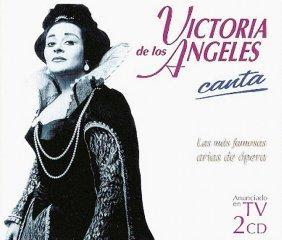Victoria de los Angeles - Canta (1998)
Victoria de los Angeles - Canta (1998)

CD1 01. Puccini - O Mio Babbino Caro (Gianni Schicchi) 02. Verdi - Ah, fors'e Lui...Sempre Libera (La Tra viata) 03. Catalani - Ebben Ne andro lontana (La Wally) 04. Bizet - L'amour Est Un Oiseau Rebelle (Carmen) 05. Bizet - Chanson boheme (Carmen) 06. Boito - L'altra notte in Fondo al Mare (Mefist ofele) 07. Massenet - Je Marche Sur Tous Les Chemins (Man on) 08. Massenet - Gavotte (Manon) 09. Mascagni - Voi Lo Sapete, o Mamma (Cavalleria Rusticana) 10. Verdi - Piangea Cantando (Otello) 11. Verdi - Ave Maria (Otello) 12. Verdi - Surta e la notte...(Ernani) 13. Puccini - Senza Mamma...(Suor Angelica) CD2 01. Rossini - Una voce poco fa (El Barbero de Sevi lla) 02. Puccini - Sí, mi chiamano Mimi (La Boheme) 03. Puccini - Donde lieta usci (La Boheme) 04. Puccini - Un bel di vedremo (Madamma Butterfly ) 05. Rossini - Nacqui all'affano (La Cenerentola) 06. Leoncavallo - Qual fiamma avea nel guardo (I P agliacci) 07. Verdi - Come in quest'ora bruna (Simon Boccane gra) 08. Gounod - O Dieu! que de bijoux...(Fausto) 09. Massenet - Va! laise couler mes larmes! (Werth er) 10. Mozart - Porgi amor (Las Bodas de Figaro) 11. Wagner - Dich teure halle (Tannhauser) 12. Wagner - Einsam in truben tagen (Lohengrin) 13. Purcell - Thy hand Belinda (Dido Y Eneas) Victoria de Los Angeles - soprano
Victoria de los Angeles was one of the finest lyric sopranos in the decades after World War II. She was born Victoria Gómez Cima. She learned to sing and play piano and guitar while still in school. She entered the Conservatorio de Liceo in Barcelona to study piano and singing. Victoria completed the six-year program in three years, graduating with full honors at the age of eighteen. Her membership in the Conservatory's Ars Musicae gave her wide exposure to the art song repertory and Baroque and Renaissance music.
De los Angeles debuted in a song recital at the Palau de la Música Catalana. Her operatic debut was also in Barcelona, at the Gran Teatro del Liceo, singing the Countess in Mozart's Marriage of Figaro.
Her national and international breakthroughs occurred after she won the Geneva International Singing Competition in 1947. She was immediately booked for performances in Madrid, singing in Manon and La Bohème opposite Beniamino Gigli before returning to Barcelona. There she moved into Germanic roles, adding Freischütz, Lohengrin, and Tannhäuser to her portrayals. The Geneva Competition had also brought her to the attention of the BBC, which brought her to London to sing the part of Salud in Manuel de Falla's La Vida Breve in 1948, when she signed an exclusive contract with EMI. This association lasted 30 years and included at least 21 full-length opera recordings, 25 solo recitals, and appearances on 40 other EMI releases.
Her first Paris appearance was in 1949, as Marguerite in Gounod's Faust, a role she repeated as her Metropolitan Opera debut in 1951. She debuted in Covent Garden in 1950, once again singing Mimì in La Bohème, which was one of the roles most closely associated with her. She sang regularly at both the Met and Covent Garden. Wieland Wagner asked her to sing in a new production of Tannhäuser opening the Bayreuth Festival for 1961.
She sang in most of the major houses of the world, touring in South Africa, the Middle East, Australia, East Asia, and Latin America (where she was a frequent guest artist at the Teatro Colón in Buenos Aires). She performed with such great conductors as Thomas Beecham, Herbert von Karajan, Georg Solti, Pierre Monteux, Carlo Maria Giulini, Charles Münch, Zubin Mehta, and Rafael Frühbeck de Burgos.
She had a wide vocal and dramatic range, singing in operas as diverse as Carmen, The Barber of Seville, Acis and Galatea, Pelléas et Mélisande, Die Meistersinger, Simon Boccanegra, Dido and Aeneas, La Traviata, and Madama Butterfly. In one evening, she sang both the roles of Nedda in I pagliacci and Santuzza in Cavalleria rusticana. As a recitalist, her vast and wide repertory embraced not only the central German and French Romantic and twentieth century eras, but had a strong representation of early music. In addition, she often added Spanish and Catalan folk songs to her solo recitals.
Besides having a lovely, warm, and dark tone, she was always noted for the intelligence of her portrayals and musical choices. She closely monitored her own singing. She retired from the operatic stage in 1969, after an exceptionally successful portrayal of Verdi's Desdemona in Dallas, though she returned to Covent Garden as Carmen in 1978.
However, she continued singing recitals. As time passed, she lowered the number of her appearances, yet reviews continued to stress the purity of her voice. She was heard to say that the moment she heard a wobble in her voice she would "shut up the shop." One of her last appearances was in connection with the 1992 Olympic Games in Barcelona, where she still exhibited characteristic vocal purity. --- Joseph Stevenson, Rovi
download: uploaded yandex 4shared mediafire solidfiles mega zalivalka filecloudio anonfiles oboom
Zmieniony (Wtorek, 17 Czerwiec 2014 11:53)
